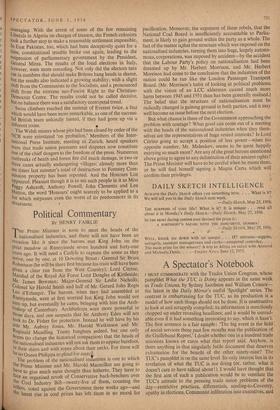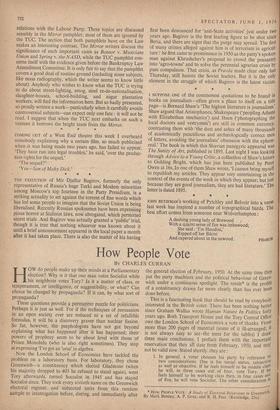A Spectator's Notebook
i MUST COMMISERATE with the Trades Union Congress, whose pamphlet What the TUC is Doing appears in the same week as Trade Unions, by Sydney Jacobson and William Connor— the latest in the Daily Mirror's useful 'Spotlight' series. The contrast is embarrassing for the TUC, as its production is a model of how such things should not be done. It is unattractive to look at and scrappily compiled; its information is mercilessly chopped up under revealing headlines; and it would be unread- able even if it had something interesting to say, which it hasn't. The first sentence is a fair sample : 'The big event in the field' of social services these past few months was the publication of the Guillebaud Report.' 1 doubt whether one in a hundred trade unionists knows or cares what that report said. Anyhow, is there anything in that singularly futile document that deserves exhumation for the benefit of the other ninety-nine? The TUC's pamphlet is on the same level. Its only interest lies in its revelation of what the TUC is not doing (or, rather, what it doesn't care to have talked about!). I would have thought that the first aim of such a publication would be to ventilate the TUC's attitude to the pressing trade union problems of the day—restrictive practices, differentials. sending-to-Coventry, apathy in elections, Communist infiltration into executives, and relations with the Labour Party. These topics are discussed sensibly in the Mirror pamphlet; most of them are ignored by the TUC. The section that both pamphlets have on the Law makes an interesting contrast. The Mirror writers discuss the significance of such important cases as Bonsor v. Musicians Union and Spring v. the NASD, while the TUC pamphlet con- cerns itself with the evidence given before the Bankruptcy Law Amendment Committee. It is only fair to say that the pamphlet covers a good deal of routine ground (including some subjects, like mass radiography, which the writer seems to know little about). Anybody who wishes to know what the TUC is trying to do about street-lighting, smog, steel re-de-nationalisation, slaughter-houses, school-building, and sugar plantation workers, will find the information here. But so badly presented, so prosily written a work—particularly when it carefully avoids controversial subjects—can expect only one fate : it will not be read. I suggest that when the TUC next embarks on such a venture it borrows the bright team from the Mirror.



































 Previous page
Previous page